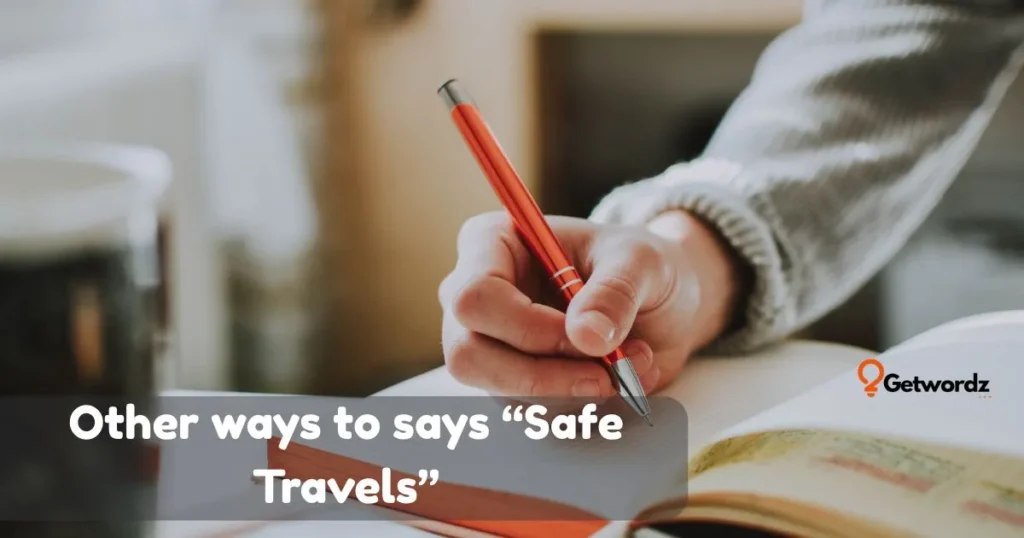Safe Travels is more than just a casual farewell, it’s a heartfelt wish for someone’s journey to be smooth, worry-free, and full of memorable experiences. Whether you’re sending off a friend on a weekend getaway, a colleague on a business trip, or a family member embarking on an adventure, saying “safe travels” has become the go-to phrase. Yet, over time, it can start to feel a little routine, even predictable.
That’s why many people search for different ways to say safe travels, looking for fresh, creative alternatives that carry the same warmth but with a personal twist. From unique expressions and thoughtful messages to funny responses and better wording that feels genuine, there’s a world of options beyond the standard phrase.
Whether it’s for your partner, a friend, a family member, or a coworker, knowing how to convey your good wishes in a meaningful way can make the send-off even more special.
In this post, we’ll explore creative alternatives, unique expressions, and fun variations of “safe travels” that feel personal, authentic, and memorable. Ready to discover the perfect way to wish someone a smooth journey? Let’s dive in.
1. Safe Journeys
Scenario: You’re seeing off your cousin at the airport for a solo trip abroad. You want to wish them a smooth and enjoyable adventure.
Explanation: “Safe journeys” is a warm, slightly formal alternative to “safe travels,” often used in professional or family settings. It conveys care and concern while sounding more elegant and thoughtful.
Examples:
- “Safe journeys, Aunt Lisa! Can’t wait to hear all about your trip.”
- “Wishing you safe journeys as you explore Europe!”
- “Safe journeys, team, let’s reconvene next week with new ideas.”
Why It Works: This phrase is versatile and heartfelt. It works for colleagues, family, or friends, signaling genuine concern while avoiding overused expressions.
2. Travel Safely
Scenario: Your friend is about to drive cross-country for a music festival.
Explanation: “Travel safely” is a casual and supportive phrase. It’s a simple, clear way to show you care about someone’s well-being during a trip.
Examples:
- “Travel safely and text me when you arrive!”
- “Don’t forget your passport! Travel safely, buddy.”
- “Travel safely, everyone, and enjoy the hike.”
Why It Works: It’s direct, versatile, and easy to include in texts, emails, or spoken goodbyes, making it a practical alternative to “safe travels.”
3. Bon Voyage
Scenario: Your partner is leaving for a summer vacation abroad.
Explanation: “Bon voyage” is a classic, slightly fancy French-inspired phrase. It’s ideal for adding charm or a touch of international flair when wishing someone a pleasant journey.
Examples:
- “Bon voyage! Hope your cruise is amazing.”
- “Bon voyage, Dad! Don’t forget to take lots of photos.”
- “Bon voyage, team! Let’s make this a memorable trip.”
Why It Works: It stands out as a creative alternative, instantly elevating the farewell while still being warm and sincere.
4. Have a Safe Trip
Scenario: A coworker is leaving the office for a business conference in another city.
Explanation: This phrase is friendly and straightforward, conveying genuine concern without being overly formal. It’s a universally understood, safe choice.
Examples:
- “Have a safe trip, Sarah! Hope your presentation goes well.”
- “Enjoy the workshop and have a safe trip back home.”
- “Have a safe trip, guys! Don’t forget to bring snacks.”
Why It Works: Simple yet meaningful, it’s effective for all audiences, friends, family, or professional contacts.
5. Journey Well
Scenario: A close friend is embarking on a week-long road trip.
Explanation: “Journey well” is thoughtful and slightly poetic. It adds a personal touch while wishing someone a smooth and positive experience.
Examples:
- “Journey well, my friend. Can’t wait to hear your stories.”
- “Journey well and enjoy every moment on your hike.”
- “Wishing you to journey well during your travels.”
Why It Works: This alternative feels reflective and caring, standing out as a unique expression while staying simple and sincere.
Read more: 30 Other Ways To Say “Sorry For Your Loss” With Examples!
6. Smooth Travels
Scenario: You’re texting your sibling who’s catching a late-night flight.
Explanation: “Smooth travels” emphasizes ease and comfort during the trip. It’s casual and friendly, making it suitable for any relationship.
Examples:
- “Smooth travels! Hope the flight isn’t too bumpy.”
- “Have smooth travels, everyone, and enjoy the journey.”
- “Smooth travels, Alex! Call me when you land.”
Why It Works: It’s informal, upbeat, and reassuring a creative alternative that feels approachable.
7. Happy Travels
Scenario: A friend is setting out for a tropical vacation.
Explanation: “Happy travels” combines well-wishing with positivity. It’s cheerful and versatile, conveying joy and excitement for someone’s trip.
Examples:
- “Happy travels! Don’t forget sunscreen.”
- “Wishing you happy travels and safe adventures!”
- “Happy travels, team! Make the most of your trip.”
Why It Works: Its lighthearted tone makes it suitable for social media captions, texts, and spoken farewells.
8. Enjoy Your Trip
Scenario: Your partner is leaving for a weekend getaway.
Explanation: This phrase is casual, supportive, and perfect for friends or loved ones. It emphasizes enjoyment and positivity.
Examples:
- “Enjoy your trip! Can’t wait to see your photos.”
- “Have fun and enjoy your trip to the mountains.”
- “Enjoy your trip! Relax and recharge.”
Why It Works: Friendly and flexible, it makes the farewell feel personal and encouraging.
9. Have a Pleasant Journey
Scenario: You’re bidding farewell to a relative traveling for a wedding.
Explanation: A slightly formal and polite phrase, ideal for older family members or professional contacts. It conveys respect and good intentions.
Examples:
- “Have a pleasant journey, Uncle Joe. Travel safely!”
- “Wishing you a pleasant journey to the ceremony.”
- “Have a pleasant journey, colleagues. See you at the conference.”
Why It Works: Polite, classic, and sincere this alternative is perfect for formal contexts.
10. Godspeed
Scenario: Your friend is leaving for an ambitious overseas work project.
Explanation: “Godspeed” conveys hope for safety, success, and positive outcomes. It’s slightly dramatic but heartfelt.
Examples:
- “Godspeed on your new adventure!”
- “Godspeed, team! Bring back great stories.”
- “Godspeed, Sarah. Wishing you all the best on your journey.”
Why It Works: Unique and memorable, it adds a sense of gravity and care, making it stand out as a powerful alternative.
Read more: 30 Other Ways To Say “The End In a Story” With Examples!
11. Travel Well
Scenario: Your cousin is flying to a distant city for a college exchange program.
Explanation: “Travel well” is concise, caring, and universal. It emphasizes wellness and positive experiences rather than just safety.
Examples:
- “Travel well and enjoy your semester abroad!”
- “Travel well, my friend. Can’t wait to hear all about it.”
- “Travel well, and may your trip be smooth and joyful.”
Why It Works: Short, flexible, and personal, it works in texts, emails, and spoken goodbyes.
12. Bon Appétit of Travel
Scenario: You jokingly wish your foodie friend a great trip to a culinary festival.
Explanation: Playful and creative, this phrase is a fun twist on “bon voyage,” showing humor and personality.
Examples:
- “Bon appétit of travel! Hope you find the best street food.”
- “Bon appétit of travel, chef! Enjoy every bite along the way.”
- “Bon appétit of travel taste every adventure fully!”
Why It Works: Memorable and fun, it’s perfect for friends with shared humor or interests.
13. See You Safe
Scenario: A roommate is leaving for a long road trip, and you’re waiting for their return.
Explanation: Informal and caring, “See you safe” is a personal twist that emphasizes the desire for the person’s safe return.
Examples:
- “Drive carefully, see you safe!”
- “See you safe, buddy! Call when you arrive.”
- “Have a great trip and see you safe next week.”
Why It Works: Intimate and direct, it creates a bond and reassurance beyond the standard farewell.
14. Have a Wonderful Journey
Scenario: A family friend is leaving for a cruise.
Explanation: Polite, uplifting, and slightly formal, it conveys warmth and positivity for the whole experience.
Examples:
- “Have a wonderful journey, Aunt Mary!”
- “Wishing you a wonderful journey across the seas.”
- “Have a wonderful journey, team, and make amazing memories.”
Why It Works: It feels sincere, encouraging, and celebratory, ideal for special occasions or long trips.
15. Take Care on Your Trip
Scenario: Your friend is flying internationally for a conference.
Explanation: Casual and personal, this phrase emphasizes safety and personal well-being.
Examples:
- “Take care on your trip, and text me updates.”
- “Take care on your trip, Mark! Don’t overpack.”
- “Take care on your trip, friends, and enjoy every moment.”
Why It Works: Warm, relatable, and flexible it’s a natural way to show concern and affection.
Read more: 30 Other Ways To Say “Happy Married Life” With Examples!
16. Have a Pleasant Trip
Scenario: A colleague is leaving for a week-long business trip.
Explanation: “Have a pleasant trip” is polite, professional, and thoughtful. It’s a versatile alternative that works well in office or formal settings while still sounding warm.
Examples:
- “Have a pleasant trip, Laura! Safe flight.”
- “Enjoy your conference and have a pleasant trip.”
- “Have a pleasant trip, everyone, and don’t forget to update us.”
Why It Works: The phrase is courteous and considerate, perfect for professional or semi-formal farewells, conveying sincerity without overdoing it.
17. Safe Passage
Scenario: A friend is embarking on a long overseas journey.
Explanation: “Safe passage” is slightly formal and traditional. It emphasizes security and smooth travel, often used for longer or more significant trips.
Examples:
- “Wishing you safe passage across the seas.”
- “Safe passage, my friend! Can’t wait to hear from you.”
- “May your journey be calm and safe passage guaranteed.”
Why It Works: Unique and memorable, it conveys care and thoughtfulness, making it feel meaningful and distinct.
18. Travel Happy
Scenario: Your sibling is leaving for a music festival or vacation.
Explanation: “Travel happy” is casual, fun, and cheerful. It emphasizes enjoyment alongside safety, making it a positive and upbeat alternative.
Examples:
- “Travel happy! Take lots of photos.”
- “Travel happy, Alex! Hope the festival is amazing.”
- “Travel happily, friends, and make every moment count.”
Why It Works: Its playful tone adds personality and warmth, making your farewell feel lively and sincere.
19. Have a Great Trip
Scenario: A friend is leaving for a weekend getaway.
Explanation: This is one of the most commonly used alternatives to “safe travels,” simple and direct. It works in casual, friendly, and even semi-professional contexts.
Examples:
- “Have a great trip! Enjoy every moment.”
- “Have a great trip, team! Stay safe.”
- “Have a great trip, Dad! Can’t wait to hear all about it.”
Why It Works: Its simplicity and universality make it practical for texts, emails, or spoken goodbyes without losing warmth.
20. Keep Safe on Your Journey
Scenario: A family member is traveling to a new city for college.
Explanation: Emphasizes protection and well-being throughout the journey. It’s caring and slightly formal but still personal.
Examples:
- “Keep safe on your journey, dear niece.”
- “Keep safe on your journey, friends, and enjoy every moment.”
- “Keep safe on your journey and take good care of yourself.”
Why It Works: Shows genuine concern and mindfulness, adding a thoughtful touch beyond the usual “safe travels.”
21. May Your Journey Be Safe
Scenario: Your partner is leaving for a road trip through the countryside.
Explanation: Slightly poetic and formal, this phrase expresses hope and positivity for a secure and smooth journey.
Examples:
- “May your journey be safe and full of adventure.”
- “May your journey be safe, and the roads clear.”
- “Wishing you may your journey be safe and enjoyable.”
Why It Works: Its thoughtful tone makes it memorable, expressing genuine care while remaining elegant.
22. Take Care and Travel Well
Scenario: A close friend is heading overseas for work.
Explanation: Combines care with encouragement, making it suitable for informal yet meaningful farewells.
Examples:
- “Take care and travel well, Jenna!”
- “Take care and travel well on your new adventure.”
- “Take care and travel well, everyone see you soon.”
Why It Works: This dual message shows attentiveness and warmth, making it a friendly and thoughtful alternative.
23. Smooth Sailing
Scenario: Someone is leaving for a cruise or sea voyage.
Explanation: “Smooth sailing” is a fun, idiomatic alternative often used metaphorically for any trip. It conveys ease, success, and worry-free travel.
Examples:
- “Smooth sailing on your cruise!”
- “Hope you have smooth sailing throughout your journey.”
- “Smooth sailing, friends, and enjoy every wave!”
Why It Works: Memorable and playful, it adds charm while still wishing safety and comfort.
24. Wishing You Safe and Happy Travels
Scenario: Sending a text to multiple friends leaving for a group vacation.
Explanation: Combines care for safety and enjoyment, making it an inclusive, warm, and complete farewell message.
Examples:
- “Wishing you safe and happy travels, team!”
- “Wishing you safe and happy travels on your mountain trip.”
- “Friends, wishing you safe and happy travels! See you soon.”
Why It Works: Combines positivity with caution, showing both affection and attention to well-being.
25. Bon Voyage and Take Care
Scenario: A loved one is heading to another country for studies.
Explanation: A slightly extended version of “bon voyage,” adding a caring layer to a classic farewell.
Examples:
- “Bon voyage and take care, Emily!”
- “Bon voyage and take care on your European trip.”
- “Bon voyage and take care, team! Have fun and stay safe.”
Why It Works: Balances charm with genuine concern, creating a heartfelt, complete farewell.
Read more: 30 Other Ways To Say “Happy To Hear That” With Examples!
26. Safe Travels Ahead
Scenario: A friend is leaving for a long-distance road trip.
Explanation: Emphasizes foresight and positivity, wishing safety for the journey ahead.
Examples:
- “Safe travels ahead! Keep me posted.”
- “Safe travels ahead, everyone, and enjoy the adventure.”
- “Safe travels ahead! Can’t wait to hear your stories.”
Why It Works: Encouraging and optimistic, it stands out by focusing on the upcoming journey.
27. Journey Safely
Scenario: A sibling is heading to a hiking trip in a national park.
Explanation: Short, clear, and caring, emphasizing personal safety during the journey.
Examples:
- “Journey safely! Don’t forget your hiking gear.”
- “Journey safely, friends, and enjoy the trails.”
- “Journey safely! Stay alert and have fun.”
Why It Works: Concise and easy to use in any medium, showing concern while remaining approachable.
28. Bon Voyage, Stay Safe
Scenario: Friends are leaving for an international holiday together.
Explanation: Combines a playful, classic farewell with a note of caution, creating a balanced, caring message.
Examples:
- “Bon voyage, stay safe! Enjoy every city you visit.”
- “Bon voyage, stay safe, and have the best time!”
- “Bon voyage, stay safe, team! Take lots of photos.”
Why It Works: Adds personalization and sincerity, making it versatile and thoughtful.
29. Have a Memorable Trip
Scenario: A friend is leaving for a once-in-a-lifetime vacation.
Explanation: Emphasizes the joy and experiences of the journey, rather than just safety.
Examples:
- “Have a memorable trip, Sarah! Capture all the moments.”
- “Have a memorable trip, friends, and enjoy every adventure.”
- “Have a memorable trip! Can’t wait to see your photos.”
Why It Works: Focuses on the experience and positivity, creating a meaningful and warm farewell.
30. Go Well and Travel Safe
Scenario: A cousin is heading out for a long weekend getaway.
Explanation: Combines encouragement, well-wishing, and safety, making it a complete and personal farewell phrase.
Examples:
- “Go well and travel safely! See you soon.”
- “Go well and travel safely on your road trip, Alex.”
- “Go well and travel safely, team! Enjoy every moment.”
Why It Works: Comprehensive, friendly, and caring, it works across multiple contexts and emphasizes both well-being and positivity.
Pros and cons of Using “Safe Travels”
pros
- Universal Understanding: Everyone knows what it means, making it suitable for friends, family, or colleagues.
- Shows Care: Conveys concern for someone’s safety and well-being during their journey.
- Friendly and Warm: Simple yet affectionate, it creates a personal connection.
- Flexible Usage: Can be used in texts, emails, social media posts, or spoken farewells.
- Positive Vibes: Encourages a sense of comfort, calm, and reassurance for travelers.
Cons
- Overused Phrase: Can feel generic or cliché due to frequent use.
- Limited Creativity: Doesn’t offer a unique or memorable twist for special occasions.
- Tone May Be Too Casual: Might not feel formal enough for professional or ceremonial settings.
- Lacks Personalization: Doesn’t reflect the relationship or context uniquely without extra effort.
- Can Sound Repetitive: Using it often in communications may make it feel insincere or robotic.
Closing words
Safe Travels doesn’t have to be a simple, overused farewell. This post has shared a variety of fresh alternatives, creative expressions, and unique ways to say safe travels that help you stand out and avoid repetitive phrases.
Whether you’re texting a friend, writing a note to a colleague, or posting on social media, these different ways to say safe travels offer thoughtful, personal, and memorable options.
Try one of these phrases in your next message to show genuine care and creativity. Using these alternatives not only makes your communication more authentic but also adds warmth and impact to every farewell. Make every journey special with safe travels expressed in new, meaningful ways.




